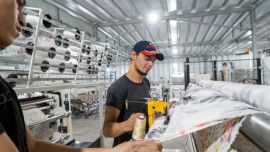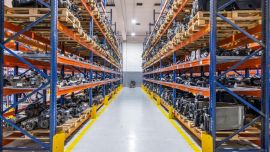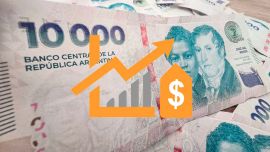The European Union and South America’s biggest economies are closer than ever to concluding a major trade agreement more than two decades in the making, with leaders from both regions optimistic they can strike the elusive deal next week.
European Commission President Ursula von der Leyen and Brazil leader Luiz Inácio Lula da Silva are planning to meet on the sidelines of the United Nations’ COP28 climate summit in Dubai to make a final political push for the agreement, people familiar with the matter said.
The meeting, which could take place on Saturday, will occur amid significant advances in technical negotiations between the two sides that have moved them closer to surpassing the environmental differences that derailed a previous iteration in its final stages, according to the people, who requested anonymity because they were not authorised to speak publicly.
The deal between the EU and Mercosur — a customs union made up of Argentina, Brazil, Uruguay and Paraguay — would create an integrated market of 780 million consumers, making it the largest agreement in the European bloc’s history and one of the world’s biggest free trade pacts.
It would save European exporters around €4 billion (US$4.4 billion) in import tariffs while providing links to suppliers of critical materials for the development of green and digital technologies. For South America, it promises a jolt to industries seeking expanded access to European markets and an agricultural sector that already drives the region’s status as a top exporter of beef, soybeans, coffee and other products.
The agreement would also pull the two regions closer amid a broader global competition for influence in which China and Russia have sought to make inroads into resource-rich nations across the Americas.
Environmental hurdles
The ongoing talks are bringing the deal back to the brink of completion, after the two sides concluded 20 years of technical negotiations with an agreement in 2019. That pact was never finalised, after some EU states raised concerns about rising deforestation rates in the Amazon rainforest under former Brazil President Jair Bolsonaro.
Those demands have remained a challenge under Lula, who has called Europe’s environmental terms “offensive” and said any agreement must treat South America “on equal terms.” But the leftist leader who took office in January pledging to reunite a fractured Mercosur and push the deal past the finish line has intensified his efforts in recent weeks, seeking to get it done before Brazil’s term as the bloc’s rotating president ends in early December.
Von der Leyen is hunting her own trade victory after the collapse of an agreement with Australia and her commission’s failure to reach a permanent solution to a steel and aluminium dispute with the US last month.
Negotiators have in recent months discussed an additional instrument to address some of Europe’s environmental issues. In return, the EU has considered some targeted demands from Mercosur, including on issues of government procurement, as Brazil seeks to protect domestic companies’ access to public contracts.
Talks have taken place in-person and remotely every few days, and there is a strong willingness to seal the deal on both sides, diplomats from each region said.
“There are very few technical issues remaining,” Spain’s top trade official, Xiana Méndez, said during a Monday press conference in Brussels, adding that “important” efforts to reach a conclusion have been made in recent weeks.
The negotiations are now advanced enough that Valdis Dombrovskis, the European Commission’s vice president for trade, is considering a trip to Mercosur’s December 7 summit in Rio de Janeiro, the people added.
“Technical negotiations are right for the final political push,” Dombrovskis said during the press conference with Méndez.
Final details
Still, officials remain cautious as negotiations enter a critical phase with important outstanding issues to solve and last-minute surprises a worry after so many close calls.
Those issues include Brazil’s push to use its own deforestation data and a compensatory mechanism in case a country unilaterally restricts imports of Brazilian products, one person familiar with the negotiations said.
Argentina also wants funds to help adapt to environmental demands, and has insisted on phasing out tariffs on imported electric vehicles more slowly to help it reshape its domestic automobile industry, the person added.
President-elect Javier Milei’s victory in Argentina’s election earlier this month initially raised doubts about the agreement’s future, after he criticised Mercosur during his campaign. But the new administration won’t derail the agreement and wants to see a conclusion “soon, hopefully before December 7,” incoming Foreign Minister Diana Mondino told Bloomberg News on Wednesday.
Germany is also confident that a breakthrough can be reached and announced very soon, according to the officials who spoke on condition of anonymity.
Lula and German Chancellor Olaf Scholz are set to discuss the current progress on Monday in Berlin, where they will participate in a Brazil-Germany summit that will include a joint cabinet meeting and a large business conference, the officials added.
related news
by Jorge Valero, Daniel Carvalho & Manuela Tobias, Bloomberg






















Comments